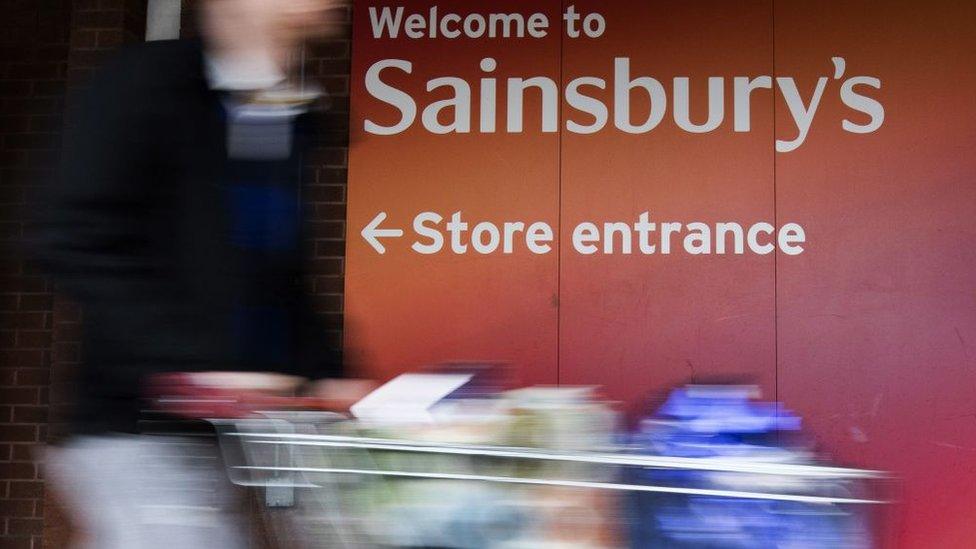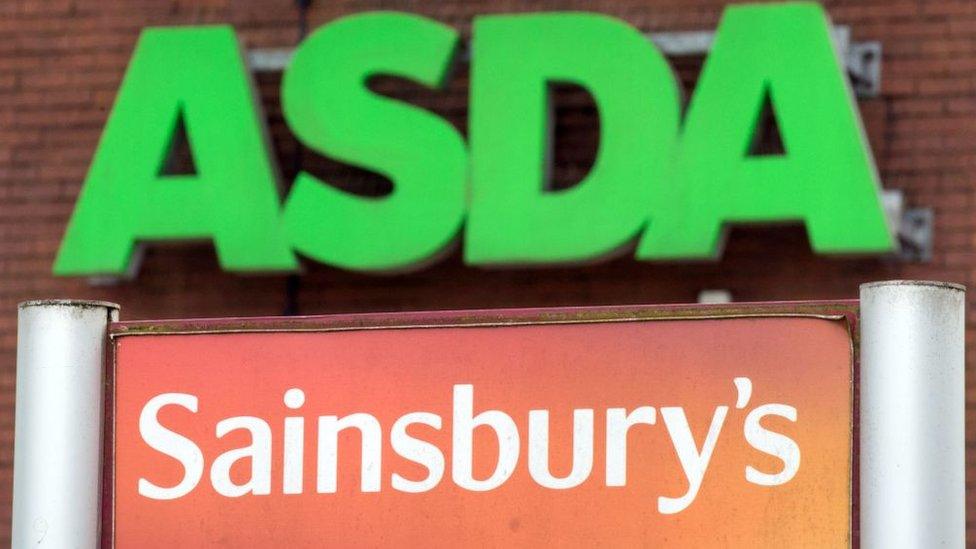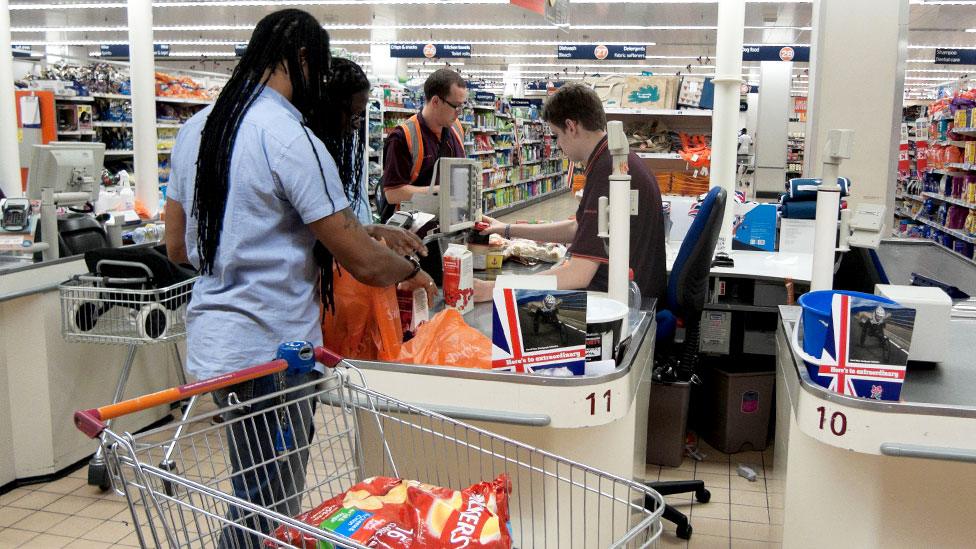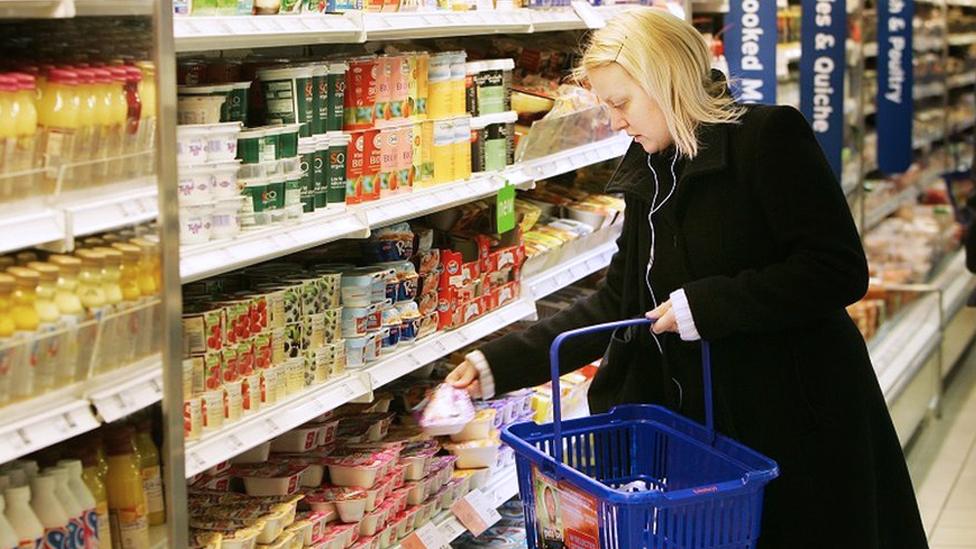Failed Asda bid cost Sainsbury's £46m
- Published
- comments

The failed bid to merge with rival Asda cost Sainsbury's £46m, the supermarket giant has said.
In April, a proposed merger between Sainsbury's and Asda was blocked by the UK's competition watchdog over fears it would raise prices for consumers.
Sainsbury's said that like-for-like sales growth slowed in the fourth quarter, especially over the Christmas period.
It added it would accelerate investment in its stores and technology.
Fourth-quarter sales fell 0.9%, having fallen 1.1% over Christmas.
In the year ending 9 March, profit before tax fell to £239m, from £409m the previous year.
Costs for the year included the failed Asda bid, restructuring costs of £81m and defined benefit pension expenses of £118m.
Retail analyst Steve Dresser said in a tweet, external that the second half of the year was "poor for Sainsbury's really", taking into consideration "Halloween, Christmas, Mother's Day, Valentine's Day, Comic Relief" and a "hot summer in first half too".


Sainsbury's chief executive Mike Coupe was not his usual Tiggerish self when presenting this set of results.
He gave the impression of someone trying to make the best of a less-than-ideal outcome - which, of course, he was.
In his ideal world, he would have been talking about the final preparations for the merger with Asda, but that was blown out of the water by the Competition and Markets Authority last week.
Instead, he was left to describe a fairly mundane set of annual results in glowing terms.
They show a company that is fighting hard on all fronts - trying to compete against aggressive low-price rivals and a resurgent Tesco, while at the same time finding the money to improve its stores, reduce debt and maintain dividend payments to shareholders.
Once you include restructuring costs and a £46m hit on the failed deal with Asda, statutory profits were down one-third to £219m - a tiny number for a company that has annual sales of £32bn.
Sainsbury insiders had warned against expecting a big strategic relaunch, a Plan B after the Asda failure.
Shareholders will still be disappointed that there wasn't one, and will no doubt be pressing hard on whether - or rather when - it will emerge.


Chief executive Mike Coupe told the BBC's Today programme: "Well, we draw a line under the past... The authorities blocked the [Asda] deal, but we think our business is adapting to the changing world of retail, and we will will carry on investing in our business."
Mr Coupe said Sainsbury's would invest in 400 supermarkets over the next year and would continue to put money into online sales.
The investment will include refurbishment of some big stores, including Hedge End near Southampton.
He added that he would be "sticking to the company" when questioned about whether he had been asked to step down after the failed merger.
On a media call, he said "I'm planning to stay," adding that shareholders and the board had been supportive.
Sainsbury's shares took a big tumble in February after a preliminary decision against the merger by the competition watchdog, falling from 287.9p per share to 234.5p over the course of a day.
The share price dipped as low as 216p in the last week of April.
Laith Khalaf, a senior analyst at Hargreaves Lansdown, said: "The market's been worried about Sainsbury's ever since the tie-up with Asda fell through, and while underlying performance hasn't been stellar, the supermarket's beaten expectations, and that's provided the share price with a much-needed fillip.
"However, it's a bit premature to pop any champagne corks just yet."
He said one-off costs had led to a "steep decline" in reported profits, adding that "the supermarket's debt pile also looks pretty high, though the good news is the pension scheme has moved into surplus".
Mr Khalaf added: "Perhaps most concerning is that sales growth is flatlining at best. In some bits of the business, notably clothing and general merchandise, sales are in retreat. Of course, this all contrasts with a resurgent Tesco, which makes Sainsbury's sales performance look pallid by comparison."
- Published25 April 2019

- Published22 March 2019
